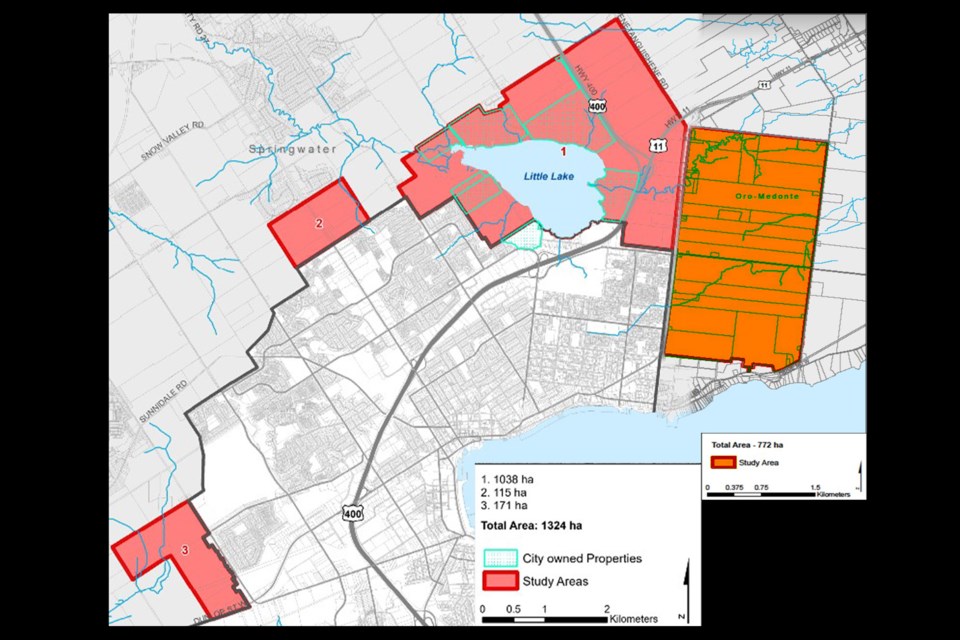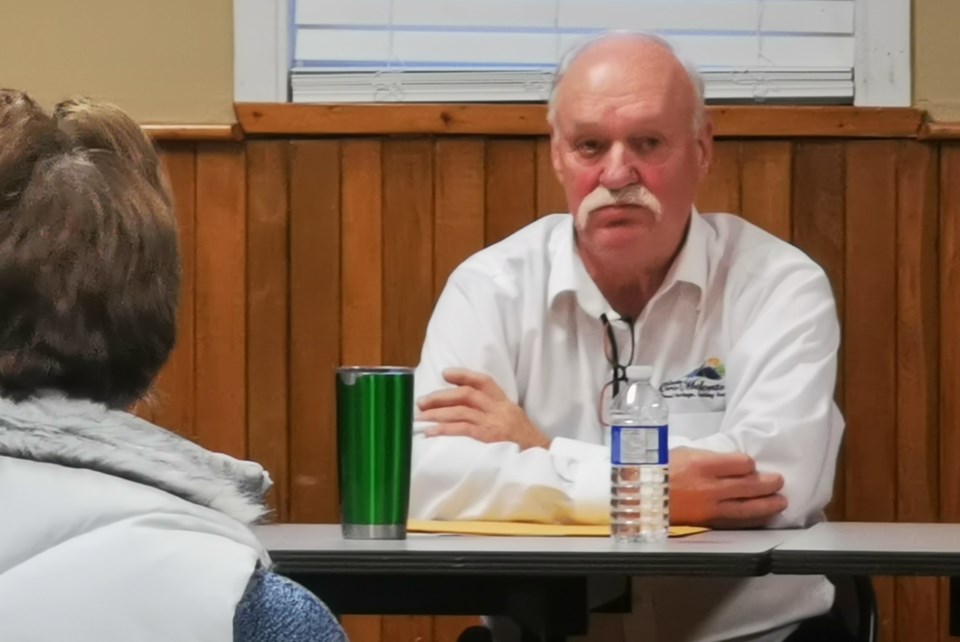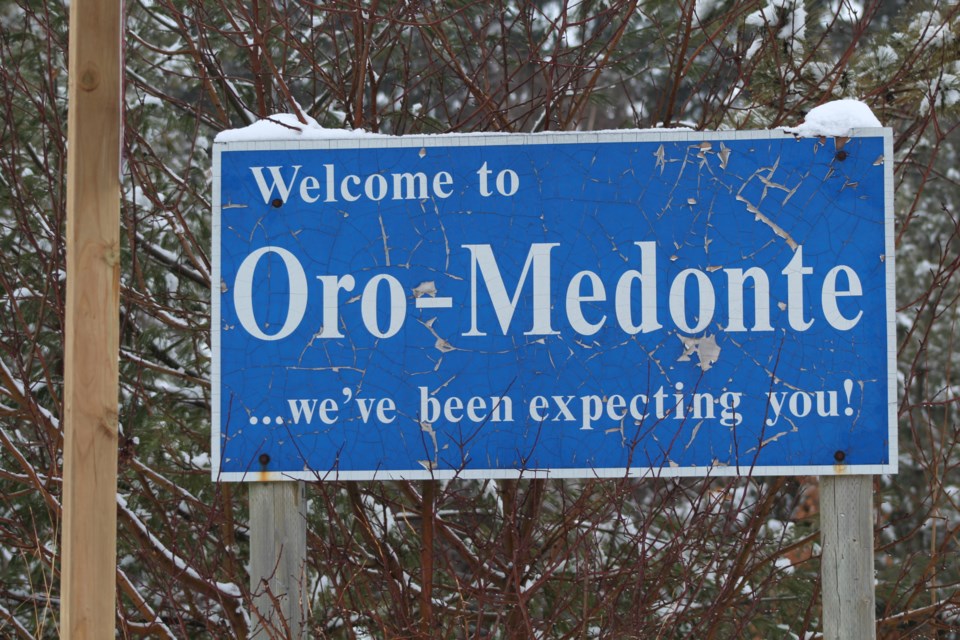As 2023 comes to an end, it’s the perfect opportunity to reflect on the year that was in the townships that border the City of Barrie to the west, north and east — Essa, Springwater and Oro-Medonte respectively.
All three of the townships had their share of headlines this year, but some stories stood out from the rest simply because of the number of people they affected, involved or impacted.
Barrie’s border expansion
The top story of the year was the City of Barrie’s planned border expansion into Springwater and Oro-Medonte, which Barrie Mayor Alex Nuttall presented Nov. 6 to the province’s standing committee on heritage, infrastructure and cultural policy.
Nuttall provided the committee with an update on Barrie’s housing targets and highlighted why the city requires additional employment land so more residents can have jobs closer to home.
He told the committee that Barrie is in dire need of land that would be suitable for large-scale manufacturing and industrial development. He said Barrie needs space to grow as a community and it needs space to bring in jobs from outside the region.
Nuttall said the city was eyeing industrial land outside its municipal borders for the purpose of job creation.

It soon became clear that Barrie was looking at land in Oro-Medonte and Springwater.
The township mayors were initially unable to respond. Both cited confidentiality because the information they had was received during a closed session of council and they were prohibited from discussing those matters.
Nuttall shared his presentation personally with Oro-Medonte Township council after making the decision to air his plan publicly.
It didn’t go well.
Oro-Medonte council told Nuttall they weren’t interested in his proposal the way it was presented, but remained congenial, promising to come to the table if anything changed.
Nuttall’s reception in Springwater was less hospitable.
Springwater Township council flat out rejected Nuttall’s plan and voted to cut off any further discussions with the City of Barrie.
Barrie was seeking a total of 2,200 hectares from its neighbours.
Nuttall said he doesn’t expect any answers from the province until the new year, and still hopes for a local solution.
“I recognize that they (Oro-Medonte, Springwater councils) are in really, really difficult positions in the sense that nobody willingly wants to, in municipal governance, wants to give up land,” he said. “I wish there was a way to have a super committee, to have the three councils sit down.”
Nuttall said the city has not received any formal response from the province to Barrie’s Official Plan request.
“The last time that we tried to ask for additional land supply was, I think, a seven-year process,” he said, referring to the provincially mandated Barrie-Innisfil Boundary Adjustment Act that went into effect Jan. 1, 2010. “My first formal ask was Nov. 6, so that’s the start of the ticker for the province.”
Oro-Medonte councillor reprimanded
Oro-Medonte Coun. Richard Schell made headlines for all the wrong reasons.
The first-term councillor, who was elected to represent Ward 5, was reprimanded and had his pay suspended for 60 days in November after township’s integrity commissioner John Ewart found he had breached both the Municipal Code of Conduct and the Municipal Conflict of Interest Act.
In his written decision on Nov. 14, Ewart said the councillor breached the Municipal Code of Conduct by distributing a court document to five members of council on Aug. 29, 2023 in an attempt to "influence" council or members of council regarding short-term rentals.
Ewart's report also said the councillor contravened the Municipal Conflict of Interest Act after declaring a pecuniary conflict of interest.
Less than a week after the integrity commissioner’s ruling, at a Ward 5 town-hall meeting in Hawkestone, Schell was mocked, jeered and booed by upward of 100 Oro-Medonte residents.
During the open discussion on short-term rentals, Schell became a lightning rod.
Schell produced two documents, one he said was from the Ontario Land Tribunal (OLT) and another one from the Superior Court of Justice. Both documents show, he claimed, that “short-term rentals are legal.”
Schell, who operates a bed and breakfast in Oro-Medonte, was challenged on the contents of the documents by lawyer Dean Blaine, who asked Schell to elaborate.

One document was from the Ontario Land Tribunal, issued Aug. 24, 2022. The second was from the Ontario Superior Court of Justice division court, dated March 24, 2023.
Blaine told Schell the OLT decision, from Aug. 24, 2022, was on the commercial accommodation amendment. The bylaw that was in place, he added, prior to that amendment being enacted by the previous council, already prohibited short-term rentals in the township.
Blain said the stand-alone amendment that was appealed by the short-term operators only dealt with the definition of commercial accommodation — it didn't affect the underlying bylaw.
“Second point is that decision is currently the one that’s under appeal and the Ontario Superior Court, in their initial preliminary findings, found it contains errors in law," Blain said.
The second document was found to be the factum of the responding party - the Oro-Medonte Associations for Responsible STRS.
Blain asked Schell if that document — the factum of the Oro-Medonte Associations for Responsible STRs — was the subject of the integrity commissioner’s report, which recommended the reprimand and loss of pay.
“That is correct,” Schell said.
At the end of their exchange, Schell thanked Blaine for his contribution to the meeting.
Then he doubled down.
“These are a set of facts, court documents, and, quite frankly, I believe them," Schell said.
A few weeks later, on Dec. 20, at a special session of council, Schell once again thumbed his nose at the IC’s report.
“I do accept the integrity commissioner’s report, although I do disagree with the findings and I also disagree with the penalty that was imposed,” Schell said.
Water-taking permits
Water has been a major topic in the townships for a few years, especially as it relates to aggregate extraction.
Two years ago, Galibier Materials Inc., owners of the Lewis Pit in Springwater Township, had its take water permit extended for five years, until 2026. (The company is currently before the Ontario Land Tribunal regarding its application to extend its extraction operations to the property beside the current Lewis Pit.)
According to its permit, Galibier can withdraw a maximum volume of 2,937,600 litres per day.
In September, The Sarjeant Company Limited requested a water-taking permit which would have a maximum volume withdrawal of 654,624 litres per day.
According to the Environmental Registry of Ontario, Permit to Take Water No. 1717-CXBTST was issued to Sarjeant on Dec. 13, 2023 for eight years.

As of Dec. 22, the decision is being appealed.
Mike MacMillan, Sarjeants’ assistant general manager, urged people to exercise a bit of caution when reviewing the application.
“One cannot get a realistic approximation of actual water taking by multiplying the theoretical maximum water-taking by the theoretical maximum days in the application,” MacMillan said. “In reality, our water pump usually only runs about three times per week, only during working hours, and doesn't run at all in the winter or periods when we are not washing.”
MacMillan said washing sand, referred to as desilting, is essential in producing sand with the correct specification for use in concrete.
Water experts Dr. Bill Shotyk and Dr. Michael Powell, who just received their official partner status with Springwater Township, are launching a five-year study called the Elmvale Groundwater Project, conducted through the University of Alberta.
One of their primary concerns is “the connection with various government agencies to assist in enhancing current regulations and decision making as it relates to permits to take water (PTTW), and how this study will promote ongoing and future aggregate extraction in an environmentally responsible fashion.”
While they understand the needs of the aggregate industry, and they’re not against development, they are concerned with taking natural resources that have never been inventoried or thoroughly studied.
Powell said there has been no conclusive study into the region’s water resources. That alone, he added, should be enough for a government or municipality to exercise caution when it comes to land use changes and taking water.
“We may find that that operation (aggregate extraction) has nothing to do with the quality of water or we may find out that it has a lot to do with water quality,” Powell said.
“Until we do this study, no one can say, and nobody that has done any kind of reconnaissance on this stuff to get permits for land use change or water use, none of them have done the work where they can say they won’t impact quality or quantity of the water, even though that’s one of the main criteria for allowing land use change and water taking," he added.
According to Powell, all water is not created equal — some water is actually better suited for washing aggregates.
“We know this a natural laboratory producing the cleanest water in the world,” he said, “We know what the geochemical processes are, what the microbiological and natural processes are but we don’t know how they relate in the stack of sediments and we don’t know the relative importance of each.”
Powell said the water he’s talking about — the township's spring water — is in a relatively small watershed. He calls the water in it “the crown jewel” of Canada’s resources.
“It should be treated like the monarch butterfly is around the world,” Powell said. “It’s more unique than that. And yet, we’re allowing the use of this pure water to wash dirt.”
Crime increases at Boots and Hearts
One in six charges laid by the Ontario Provincial Police at this past summer’s Boots and Heart music festival was for sexual assault.
“There were seven sexual assaults reported at this year’s event,” Orillia OPP detachment commander Insp. Coyer Yateman said in an email to BarrieToday.
He could provide few details.
“Many of these cases are currently before the courts,” he said. “It would be inappropriate to discuss these cases further at this time.”

Over the course of this year’s festival, which was held Aug. 10-13, the OPP says it responded to 174 calls for service, including 21 for violent criminal code infractions, 11 property crime violations, 11 traffic violations and two drug violations.
Following a complicated and protracted explanation of how the OPP billing model works, Sgt. Lisa Rotar told Oro-Medonte Township council that “based on the 2024 calls for service costs estimator tool, the billable calls for service total is estimated to be $78,722 for this event (Boots and Hearts) this year.”
Add an additional $25,625 in overtime for OPP and civilians associated with the event and Oro-Medonte taxpayers could be looking at a bill in excess of $100,000.
Yateman said large-scale events like Boots and Hearts, which essentially create instant small cities, pose significant policing challenges, especially when it comes to personal safety, drugs and alcohol.
“Alcohol and substance use and over-consumption pose challenges,” Yateman said. “Lack of sleep and food, coupled with substance abuse, will affect patron behaviour.”
He also noted that there were concerns about festival goers’ safety due to the storms that blew through the area. He said there were “many people sleeping outdoors or with limited shelter options.”
Yateman said the OPP has had a similar number of paid duty officers at the event every year. In fact, the OPP increased the number of paid-duty officers for this year’s event to 146, up from 128 last year.
The OPP has also recommended increased training to festival security and that the festival implement CCTV (close circuit) cameras throughout the grounds to assist should an investigation be required.
Heightened legal costs
While every municipality needs money for legal representation, one municipality is spending a small fortune.
At the end of the first half of 2023, Oro-Medonte Township exceeded its budget for legal expenditures by almost $200,000. The total amount spent on legal fees for 2023 won’t be known until some time next year.

At a recent town-hall meeting, Oro-Medonte Mayor Randy Greenlaw and Deputy Mayor Peter Lavoie told the audience the township has already spent about $800,000 fighting the cannabis producers who have popped up in the township.
He said the Ontario Land Tribunal that is hearing the case has recommended the sides find a resolution.
“As a matter of public record, the new member of the OLT has directed the parties to find a solution by way of setbacks,” Lavoie said. “They’ve essentially ruled out, by way of the OLT chair, the question as to whether or not growing cannabis outdoors is the question remaining for the OLT to determine.”
Greenlaw explained that OMAFRA (the Ontario Ministry of Agriculture, Food and Rural Affairs), the provincial body that oversees agriculture, deems agricultural land is for crop growing and since the federal government legalized cannabis, they deem it as a crop, no different than tomatoes, squash or hay.
Greenlaw said OMAFRA manages pig farms and livestock farms by setbacks and that’s what the OLT has asked the township to discuss with the cannabis operators.
“Economically, I think that’s the place we’ll go first and see if we can find an amicable solution,” Greenlaw said. “It’s not going to be a home run for anybody, but at the end of the day, I did run on making sure we clean up these things and not spend thousands and thousands of dollars on litigation.”
Oro-Medonte is also facing two other major challenges — Zone 1 water in Horseshoe Valley and short-term rentals — both of which have been eating up taxpayer money for years.
“A priority, I think, is closing some of the files we inherited — short term rentals, cannabis, Zone 1 water and a couple of other issues that aren’t quite as significant, to minimize our expenditures for legal,” Greenlaw said, adding the high cost of litigating is costing everyone in the township.
“At the end of the day, the money’s got to come from somewhere.”
That somewhere, of course, is the taxpayer.





